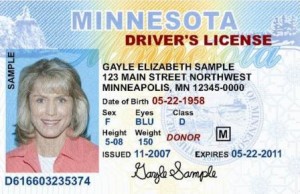You’ve probably seen the headlines and thought it was a myth, or, even worse, “click bait.”
The fact is, the rumors are true. Minnesota’s driver’s license won’t be enough to get you on an airplane in 2016, unless the state takes some quick, evasive maneuvers to rectify a problem that’s been on the books since 2005.
Congress passed the “National ID Act” under then-President George W. Bush that year, in an effort to set nationwide standards for identification cards on a national level. For whatever reason – either lawmakers believing the new cards would ‘share too much data’ or the overall cost of updating the state’s licensing system, Minnesota has failed to bring its licenses into compliance.
 That means whether you’re flying to Florence, Italy or Fargo, North Dakota, you’re going to need either a “Smart ID,” which can be ordered at your county licensing agent (and will only help on local trips, of course), or a U.S. Passport in order to clear TSA security as soon as next year.
That means whether you’re flying to Florence, Italy or Fargo, North Dakota, you’re going to need either a “Smart ID,” which can be ordered at your county licensing agent (and will only help on local trips, of course), or a U.S. Passport in order to clear TSA security as soon as next year.
Minnesota joins just a handful of other states as being out of compliance, according to Minnesota Public Radio. Also, the implementation of the Real ID Act has been rolling piece by piece. Those working at nuclear power plants, such as the Monticello location owned by Xcel Energy, have had to apply for SMART ID licenses and badges. Federal facilities have also denied Minnesota state licenses. According to MPR and the St. Paul Pioneer Press, “full enforcement of the first three phases is scheduled to be complete in October, and an enforcement date for the fourth phase — applying to those traveling on aircraft — has yet to be set.”
New York, one of the largest states in terms of population, is still out of compliance as well. Louisiana and New Hampshire are the two other states that have driver’s licenses noncompliant with federal rules. The rest of the states are compliant with the new rules or have received a federal extension.
Sen. Scott Dibble of Minneapolis told the Pioneer Press he’s not ready to say if the state is set to fold its cards and move to go with full compliance, or to try and work out a deal with the federal government. He said the issue has been discusses, yet the concerns – cost and privacy – are the same they were 10 years ago and have not been addressed.
“I just don’t know if we should be playing chicken like this with the feds at this point,” he said.